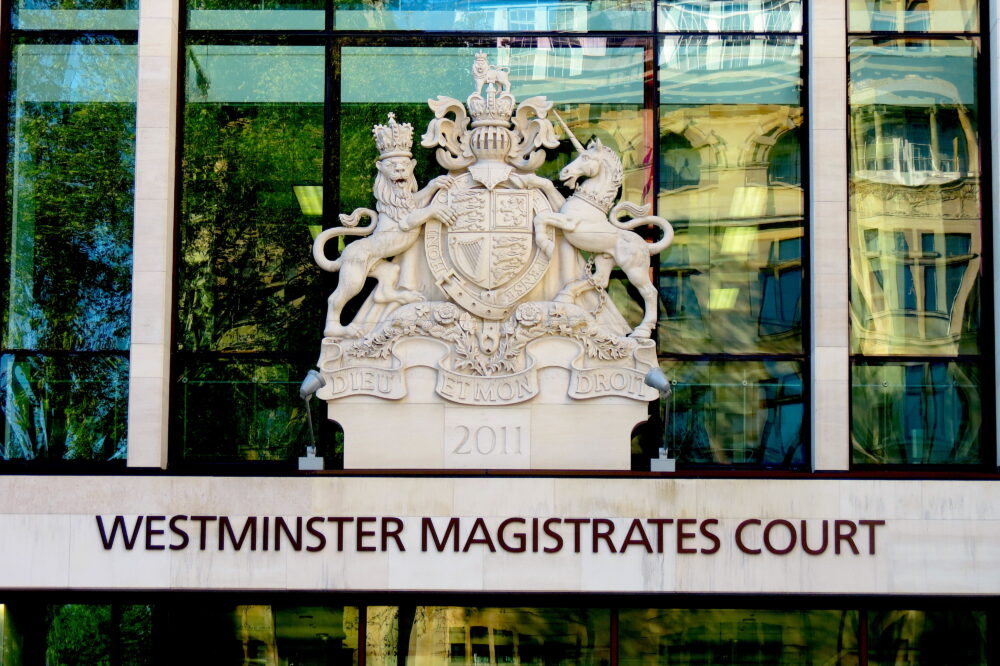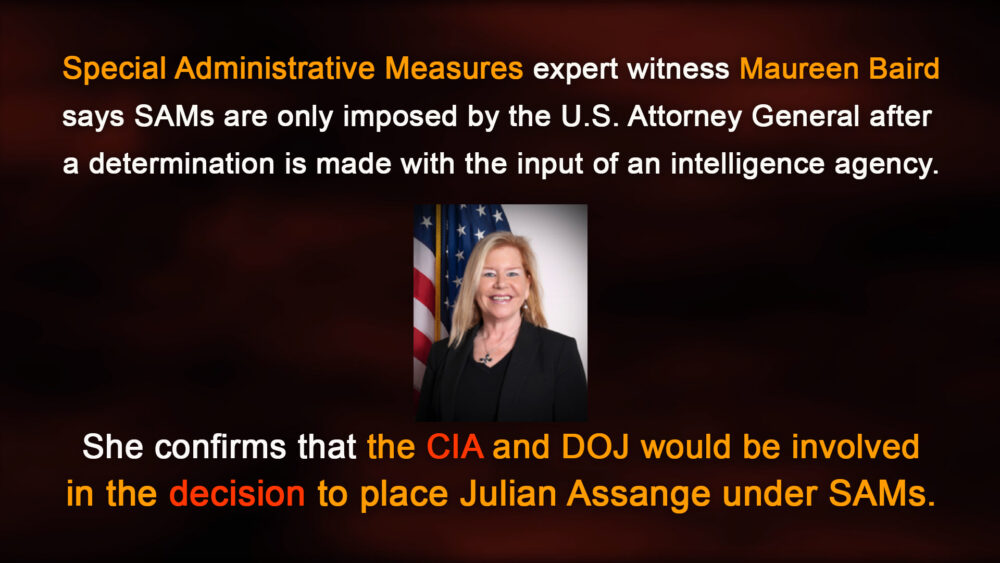On Monday, Julian Assange’s fate may be determined by the High Court: it could allow his extradition, grant him an appeal or even free him, reports Cathy Vogan.
By Cathy Vogan
in London
Special to Consortium News

Julian Assange is trying to appeal his extradition order to the United States and two High Court judges will decide on Monday whether his battle continues in the U.K., he is sent to the U.S. or is given his freedom.
Assange’s hearing begins at 10:30 am London time Monday (5:30 am EDT) at the Royal Courts of Justice. Within hours he will find out where he goes next: on a plane to the United States to stand trial; back to Belmarsh Prison to await the start of his appeal or onto the street as a free man.
Three Grounds Only
Assange has been indicted in the United States under the Espionage Act for publishing classified information revealing U.S. war crimes in Iraq and Afghanistan.
After winning his extradition trial on the basis of his health and harsh U.S. prison conditions, the United States won on appeal by promising it would not mistreat him. The British home secretary then signed his extradition order on June 17, 2022 and Assange has been trying to appeal that ever since.
After his lawyers’ 150-page submission last year to the High Court (arguing why he should have the right to appeal his extradition order) was summarily rejected by Justice Jonathan Swift, the imprisoned WikiLeaks publisher was permitted to enter a Renewal Appeal, which was heard by Dame Victoria Sharp, president of the King’s Bench, and Justice Jeremy Johnson, in February.
There were nine points to the last chance appeal and the judges said Assange had possible grounds on three of them:
- on whether he would be at risk of facing the death penalty;
- on whether he would be ”potentially very greatly prejudiced” at trial by way of his nationality; and
- on whether his conduct as a journalist could be protected by the First Amendment of the U.S. Constitution, which guarantees free speech.
Rather than setting an appeal date however, the Renewal Appeal judges decided to give the U.S. another chance at offering assurances on these points. The U.S. responded, and we will hear on Monday whether the British judges find these assurances “sufficient.”
The U.K. can not extradite someone who might face the death penalty and normally the British home secretary would seek an assurance that someone being extradited would not be executed. But that was never done so the High Court asked the U.S. for that assurance, and the U.S. has told the British court it will not seek capital punishment for Assange.
On the free speech assurance, however, because of the separation of powers in the U.S., the executive has no control over what a U.S. trial judge will decide on whether Assange can mount a First Amendment defense.
That’s why the U.S. Department of Justice could only say in their “assurance” that Assange can ask for it. It can’t guarantee it, which the U.S. must do to satisfy Britain’s obligations to the European Convention on Human Rights.
The Three Scenarios
In the first scenario, the judges accept all of the U.S. assurances, Assange’s legal moves come to an end in the U.K. and he will face imminent extradition. “He could be in the United States within one or two days of the 20th of May,” said his wife Stella Assange.
His only hope would then be a submission to the European Court of Human Rights to be accepted and acted upon in time for the court to issue an injunction against extradition.
If that happens, the U.K. would have to accept that the injunction is binding — if Britain hadn’t already made haste to bundle him off on a plane to the U.S. before the case could be stayed. It would then be heard before the European court in Strasbourg at a later date and Assange would return to Belmarsh where he’s been for five years.
In the second scenario, the two judges on Monday accept the U.S. assurance that it won’t seek the death penalty, but reject their assurance about free speech rights since only a U.S. court and not the Department of Justice can assure that. In this case a date would be set for Assange to begin a formal appeal on this ground.
But there is a third scenario: Assange could be set free on Monday, according to former British Ambassador Craig Murray. Murray told Consortium News that the two-judge panel’s power is not limited to deciding whether or not he can appeal the First Amendment issue, but to release him Monday because the U.S. could not guarantee that right.
The High Court would be obliged to release Assange if the U.S. cannot guarantee his right to free speech, as the U.S.-U.K. Extradition Act calls for as well as the European Convention on Human Rights, upon which it is based.
[See: How Britain Would Be Obliged to Free Julian]
‘The Deceitful Assaurance’

U.S. ambassador Caroline Kennedy (third from left) meets a delegation of MPs championing the Assange cause, including Bridget Archer, Josh Wilson, Andrew Wilkie, Julian Hill and David Shoebridge. (U.S. Embassy)
Australian Senator David Shoebridge, who has taken a keen interest in his fellow citizen’s case, called the First Amendment promise “a mendacious or deceitful assurance.”
What the U.S. assurance didn’t say, and what Shoebridge regarded as clear from the June 2020 U.S. Supreme Court ruling, is that it’s a matter of long-established U.S. law that foreign nationals who acted abroad have no protection whatsoever under the United States Constitution, including First Amendment protection.
Shoebridge said:
“I think one of the key principles underlying extradition, at least from countries like the United Kingdom and Australia, has been that anyone extradited will at least get equal treatment before the laws of the court to which they’re being extradited. That, you think, would be a fundamental underpinning, that you’re not going to be prejudiced in the criminal proceedings because you’re a foreigner.”
This is an argument expected from the defence in the Royal Courts of Justice on Monday, following their written submissions ahead of the hearing.
While the European Convention on Human Rights (ECHR) protects the free speech of “everyone” — though riddled with national security exceptions — the U.S. Constitution, the U.S. Supreme Court ruled, does not protect foreign nationals who acted abroad, and would therefore not protect Mr Assange.
Assange would not be protected by the Fifth Amendment either in relation to the unprecedented nature of this case, which protection he would get under the equivalent Article 7 of the ECHR that offers protection to someone who could not have foreseen that they would be acting unlawfully.
Since no journalist has ever been convicted of espionage in the U.S., we would normally expect the British judges to find the second and third assurances, at least, to be insufficient, if normalcy were expected in the Assange case.
Why Assange Was Initially ‘Released’
The U.K.’s lower court judge Vanessa Baraitser in January 2021 was satisfied by arguments heard from expert medical and prison witnesses that he would be driven to take his own life and likely to succeed, as early as learning that his extradition was imminent.
There were four expert witnesses on U.S. prison conditions at Assange’s September 2020 extradition hearing, which Consortium News attended and reported on every day. They were Maureen Baird, Yancey Ellis, Joel Sickler and Lindsay Lewis.
Follow Consortium News’ Live Tweeting of Monday’s hearing.
All of their affidavits make for a horrifying read, but it was that of Baird, a former Special Administrative Measures (SAMs) administrator, who of the four witnesses seemed to have the most influence on Judge Baraitser’s decision not to extradite, mentioning Baird in her judgement.
Baraitser also heard Sickler’s quote from the prison warden Robert Hood describing SAMs conditions at ADX, where Assange is to go if convicted, as a fate “worse than death.”
If one drops the euphemisms it’s called torture since European law considers such treatment for more than 14 days as torture. This give us insight into why Assange would commit suicide.
In their first High Court appeal against Baraitser’s ruling to release Assange on health grounds and the conditions of U.S. prisons, the U.S. assured the U.K. that Assange would not be placed under SAMs, but they included the caveat that they could change their minds if he does something to warrant such measures.
C.I.A. torture whistleblower John Kiriakou, who was imprisoned for his disclosures in a Communications Management Unit (CMU) — not much different to SAMs — told CN Live! “something” could mean looking at a guard the wrong way. That gives us a clear picture of Baird’s harrowing testimony.
She told the defence on re-examination that the C.I.A. advises the Bureau of Prisons on the specific regime of incarceration.
In the Renewal Appeal hearing in February, Mark Summers KC for the defence told the judges that Assange could be “punished” for Vault 7. He didn’t mean charged, since additional charges would have to be based on the same facts as presented in the indictments. He meant punished by the C.I.A. with a regime of isolation that would be worse than death.
The impression, shared by eight other courtroom journalists, was that the Renewal Appeal judges Sharp and Johnson knew very little about the case and it’s doubtful they understood what Summers meant, otherwise the judges would not have reasoned this way:
“210. The judge did not reject the evidence that the applicant had adduced to similar effect as untrue and the original allegations were (by some margin) serious enough to bar extradition, if the alleged misconduct was in any way connected to the extradition proceedings. The judge’s critical finding however is that there was nothing to show that the conduct in relation to the Embassy was connected to the extradition proceedings. The new evidence does not change that. On the face of the allegations (on the evidence before the judge and the fresh evidence) the contemplation of extreme measures against the applicant (whether poisoning for example or rendition) were a response to the fear that the applicant might flee to Russia. The short answer to this, is that the rationale for such conduct is removed if the applicant is extradited. Extradition would result in him being lawfully in the custody of the United States authorities, and the reasons (if they can be called that) for rendition or kidnap or assassination then fall away.
211. It follows that we decline to admit the fresh evidence. Since this proposed new ground is based solely on that evidence, we refuse leave to appeal on this ground.
A previous assurance that Mr Assange would be taken care of in the United States was accepted and the lower court decision not to extradite overturned. Ever since, despite the astonishing circumstances of this case and despite Australia’s repeated requests that the case be dropped by the U.S. and their citizen returned, the U.K. has at every turn acted in favour of the refoulement of Julian Assange into the hands of his persecutors, which is effectively a breach of international law.
We have heard reports of plea deals, but to date neither WikiLeaks nor Barry Pollack, Julian’s American lawyer, has confirmed any offer, so the risk of SAMs or CMU, not to mention the absence of all constitutional rights and additional charges that could incur the death penalty, remain in play.”
Consortium News will be reporting live from the Assange courtroom on Monday.
Joe Lauria contributed to this article.
Cathy Vogan is a filmmaker and executive producer of CN Live! She has covered the Assange court case for Consortium News since 2020.
Please Donate to the
Spring Fund Drive!







This is such an important case! The masters of the US empire expect that they can apply US laws anywhere around the world — and at the same time deny foreign nationals any of the protections of the US Constitution. How can anyone justify this, except by the fact the the US has been abducting and imprisoning foreign citizens outside the US for so many decades that people in power in the US have come to believe it is normal. It is not normal!
Then there is the issue of Freedom of the Press, and if Assange is convicted in the US for publishing in WikiLeaks the Iraq War Logs material then it will become hazardous for US newspapers to print any leaked material, and newspapers these days don’t like hazards. The WikiLeaks material was subsequently published by the New York Times, The Guardian, and The Washington Post and none of those newspapers was prosecuted, but there was not much preventing the US government from doing so back then, and now even less so.
Conviction of Assange will provide legal precedent to muzzle all the US news media, and also any foreign news source that receives leaked information.
It’s a dark time for press freedom in America.
What are the chances that a FISA court would have jurisdiction and its proceedings subject to the court’s discretion on secret evidence presented. The whole matter could be deemed a national security risk and subsequently decided without public scrutiny?
This is disgraceful treatment of a man who has never been charged with a real crime. Kangaroo court crimes are always aplenty. It will stain the US-UK-Australia for a very long time and it will be remembered as our own Dreyfus Affair.
This is not a good look for Trump, either. He promised to pardon Julian if elected but not only did he not let Julian walk free from the Ecuadorian Embassy, he was the President when Julian was dragged from there and put into Belmarsh Prison. Trump’s just swamp.
Joe Biden
Drop all charges and free this man, for the sake of freeing your own soul.
It appears self-evident that the US and UK want to spin this farce out for as long as possible with a view to Assange not surviving mentally and/or physically in Belmarsh prison. That would end the need for an actual trial with all the pitfalls that may entail. Assange now faces further months in the dungeon that is Belmarch with no end in sight.